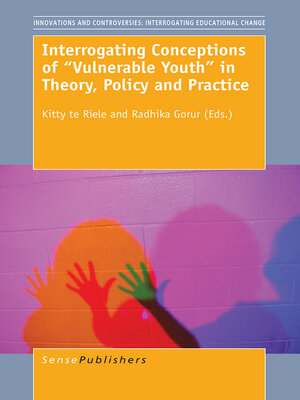Interrogating Conceptions of "Vulnerable Youth" in Theory, Policy and Practice
ebook ∣ Innovations and Controversies: Interrogating Educational Change
By Kitty te Riele

Sign up to save your library
With an OverDrive account, you can save your favorite libraries for at-a-glance information about availability. Find out more about OverDrive accounts.
Find this title in Libby, the library reading app by OverDrive.



Search for a digital library with this title
Title found at these libraries:
| Library Name | Distance |
|---|---|
| Loading... |
Young people who are considered 'vulnerable' or 'at risk' are a particular target of various policies, schemes and interventions. But what does vulnerability mean? Interrogating Conceptions of "Vulnerable Youth" explores this question in relation to various policy fields that are relevant to young people, as well for how this plays out in practice and how it is experienced by young people themselves. What makes this book unique is that most authors had the opportunity to jointly explore these issues during a two-day workshop, and their chapters are informed by their cross-agency and cross-discipline discussions, making for a nuanced and thoughtful set of contributions. This collection is highly recommended for researchers and research students in the social sciences, as well as professional staff working in youth policy and youth services, in government departments and in NGOs. "Those who are most vulnerable should receive our greatest moral attention. However, the translation of generalised moral principles into effective policy and programs has never been easy. Political interests have invariably intervened, leading to complex debates about how vulnerability should be defined, classified, measured and represented. In recent years, these debates have become further complicated, as nation-states around the world have preached austerity. This timely book suggests that the responsibility for protecting the vulnerable cannot be left to individuals, but demands collective action, through institutions such as education, health and welfare. It examines some of the ways in which public policies and programs represent those who are vulnerable, involving a range of assumptions about the social, economic and political conditions that produce their vulnerabilities." From the Foreword by Professor Fazal Rizvi







